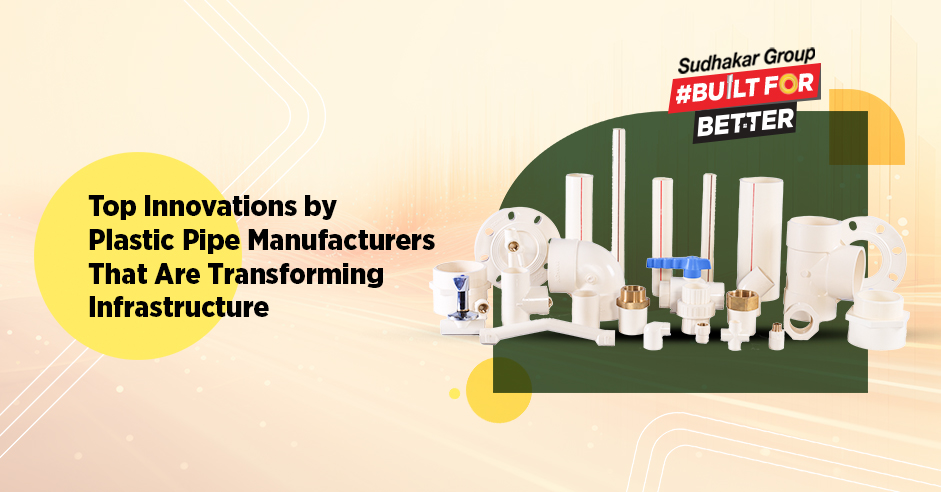There is no denying the fact that infrastructure supports progress, including the roads we drive on and the water we drink. Plastic pipe manufacturers were once limited to only water conveyance. Now, they have become leaders in technological innovation in the field of infrastructural development worldwide. Nowadays, plastic pipe manufacturers are doing much more than producing pipes. They are also engineering top-performance systems featuring smart features and designed to last for generations.
As cities continue to expand and populations continue to rise, there is an increased demand for infrastructure that is cost-effective, durable, and adaptable. The plastic pipe manufacturing industry is meeting this challenge by offering stronger, lighter, and smarter alternatives to conventional materials.
Material Advancements in PVC and HDPE Pipe Technology
The plastic industry has experienced significant growth with the introduction of modern materials, including uPVC, flexible PVC, and HDPE. These materials have applications in drainage, water supply, and agricultural systems nationwide.
- Advanced HDPE Resin
Latest innovations in HDPE pipes focus on the use of high-density polyethene grades featuring better molecular structures. These advanced materials offer ample flexibility, improved crack resistance, and enhanced stress-handling capabilities. This is particularly useful in applications such as agricultural irrigation and underground water supply.
- uPVC for Pressure Applications
These piping systems are used for SWR (Soil, Waste, and Rainwater) drainage applications. These solutions have gained considerable popularity due to their effective material compounding. New advancements offer improved temperature resistance and mechanical strength.
Rapid innovations also focus on minimising microbial growth inside pipes and preventing the build-up of scales due to long-term usage. This is a great solution for institutional plumbing, chemical drainage systems, and multi-storey buildings.
- Flexible PVC Pipes
These pipes are typically used in drip irrigation, lightweight domestic applications, and gardening. These pipes are now being upgraded to depict better pressure-bearing capacity and internal smoothness. This would lead to reduced energy consumption for a consistent water flow.
Installation-friendly Designs
- Trenchless-Compatible Design Formats
The innate flexibility of HDPE pipes makes them a great solution for trenchless installation methods like HDD or Horizontal Directional Drilling. The use of longer coils minimises the number of breaks in the existing pipeline. This format facilitates easy underground installation with minimal digging. These pipe designs are useful in telecom ducting, irrigation, and urban water supply systems.
- Modular Fittings
Modern uPVC piping systems are available with self-fit joints or rubber rings to support fast connections. These fittings are capable of accommodating slight variations in alignment and quick repairs. This form of modularity reduces installation time and improves maintenance in public utilities, buildings, and industrial applications.
Precise Manufacturing & Quality Control by Plastic Pipe Manufacturers
Advanced technologies, such as ISO-based quality systems and precision tooling, are helping plastic pipe manufacturers achieve tight tolerances in the overall wall thickness of pipes. This property helps provide a proper fit with reduced weak spots and better couplings. This consistency also enhances long-term performance and reduces the risk of leakage. Therefore, these traits are perfect for industrial, sewage, and waste pipe applications.
How Do Plastic Pipe Manufacturers Bring About Lifecycle and Sustainability Improvements?
- Low Maintenance
uPVC and HDPE pipes are capable of resisting rust, chemical wear, and scaling. When compared to metal pipes, these pipes require minimal maintenance and deliver longer lifecycles (usually more than 50 years under standard conditions). This factor leads to fewer replacements, reduced water loss, and reduced operational costs, especially in commercial and municipal infrastructure projects.
- Recyclability & Material Recoverability
As the lifecycle of a plastic pipe ends, they are effectively reused or reprocessed into construction plastics or non-pressure applications. The overall lightweight feature of these pipes makes them easier to transport.
Importance of Innovation for Plastic Pipe Manufacturers
Innovation is a crucial factor that enables plastic pipe manufacturers to meet the growing demands of modern, advanced infrastructure and applications. As modern cities continue to expand, environmental regulations are becoming increasingly stricter. Moreover, water systems are also becoming outdated. Therefore, there is an increasing need for advanced piping solutions that are durable and flexible.
Leading manufacturers that work with innovative materials like HDPE and uPVC can help maintain structural integrity, even under immense pressure and constant exposure. The use of these materials can minimise environmental impact and simplify complex installations.
In areas such as sanitation, water supply, and agriculture, rapid innovation often impacts system reliability. Moreover, as India strongly focuses on smart irrigation, rural water delivery, and effective waste management, plastic pipe manufacturers are expected to produce performance-focused, compliant piping products.
How Sudhakar Group Supports Rising Infrastructure Needs
Sudhakar Group, one of India’s leading plastic pipe manufacturers, supports the notion that infrastructure development is directly linked to the materials used and rapid innovation. This is why we have upgraded our production capabilities with industry-centric practices. We offer innovative solutions for piping systems to support the increasing demands for effective sanitation and water supply.
Our diverse range of plastic piping systems includes flexible PVC, HDPE, and uPVC pipes & fittings. All our products are designed to fulfil high-end use cases, including drainage systems, high-pressure water conveyance, domestic plumbing, and lightweight irrigation lines. We utilise advanced compounding methods to enhance chemical resistance and strength. Moreover, we also implement automated extrusion processes for dimensional accuracy. Our team conducts in-depth quality checks to ensure that every pipe performs excellently in various fields.
Conclusion
Nowadays, plastic pipe manufacturers are more than just suppliers of raw materials. They are also contributors to the future of modern infrastructure. Through the upgrade of core materials like HDPE and uPVC, as well as other advanced innovations, they aim to address real-world problems in sanitation, water distribution, and agricultural efficiency.


